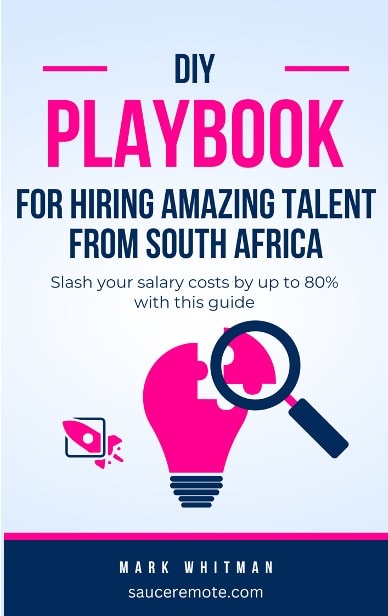Let’s talk about the employer of record cost.
How much does an Employer of Record (EOR) actually cost?
That’s a question many business owners ponder, especially if you’re eyeing global recruitment or wanting to simplify payroll and HR headaches.
The answer?
Well, it depends—but don’t worry, I’ll break it down for you.
Ready? Let’s roll!

Discover how to slash your salary costs by 80%
Get our exact process for hiring amazing overseas talent from South Africa. Includes copy-and-paste templates and a detailed salary guide.
How Much Does an Employer of Record Cost on Average?
Just like a PEO, EOR costs vary based on factors like your employee count, where you operate, and the services you need.
My pro tip: Not sure what the difference between an EOR and PEO is? Check out my guide PEO vs EOR for quick, easy answers.
Typically, an EOR can cost anywhere from $500 to $2,000 per employee per month, depending on the complexity of the country-specific employment laws and benefits.
Some providers charge a flat monthly fee per employee, while others work on a percentage of your payroll. It all comes down to how extensive the services you require are.
Are we talking about basic payroll support, or do you need full HR compliance and benefits management?
Let’s look at the factors that influence the cost of an EOR.
Hire remote talent from South Africa & slash salary costs by 80%
Salaries start from £8,000 per year!
What Factors Influence EOR Costs?
There are several factors that influence EOR costs. From my experience, these are the ones you must be aware of:
Employee Count
Like with PEO services, having more employees usually means higher costs. But here’s the good part—some EORs offer discounts as your headcount increases.
Think of it as buying in bulk; the more you need, the cheaper the unit costs.
Location
The cost for employing someone in the UK vs. Brazil? It’s going to vary.
Employment laws, taxes, and benefits packages are different across countries, and an EOR factors in all these variables.
The more complex the regulations in a country, the higher the cost of an EOR.
Services Needed
Do you only need payroll services, or do you also need HR policies, onboarding, and compliance support?
The more comprehensive the services, the higher the cost.
But sometimes, having everything handled for you is worth the peace of mind—no more late nights trying to figure out local labour laws!
Next, let’s look at EOR cost structures in more detail.
Hire remote talent from South Africa & slash salary costs by 80%
Salaries start from £8,000 per year!
EOR Cost Structures
Most typical EOR costs come in two structures. The most popular is the Flat Fee.
Flat Fee
With a flat fee, you’ll pay a fixed rate per employee per month. This approach is ideal if you value predictability in your budgeting—you know exactly what to expect month to month.
Flat fee costs typically range from $500 to $1,500 per employee.
However, some EOR providers, like Sauce, offer more competitive rates, charging a flat fee of $350 (or £250) per employee per month.
This can be a great option for businesses looking for a cost-effective solution without sacrificing quality of service.
Flat fees are particularly beneficial if you have a stable employee count and want to avoid surprises.
They also simplify the invoicing process, making it easier to plan and forecast expenses.
Plus, with a flat fee, you’re not penalised for offering higher salaries, which can be a big bonus if you’re hiring skilled professionals in competitive markets.
Hire remote talent from South Africa & slash salary costs by 80%
Salaries start from £8,000 per year!
Percentage of Payroll
Some EORs instead charge a percentage of your total payroll—typically between 10% and 20%.
This model can be advantageous for smaller businesses or those in the early stages of hiring internationally, as the initial costs may be lower if you have fewer employees or relatively modest payrolls.
However, as your payroll grows, so does the cost.
This structure can sometimes make budgeting a bit trickier, especially if you’re experiencing rapid growth or dealing with fluctuating wages.
It’s also important to note that as you expand, the percentage model may end up being more expensive compared to a flat fee, particularly in high-wage markets.
Choosing between these models depends largely on your business’s growth trajectory and payroll size.
If you’re scaling quickly or hiring highly paid employees, a flat fee might ultimately be more economical, while a percentage model may offer flexibility when just starting out.
But there are some hidden costs to watch out for.
Hire remote talent from South Africa & slash salary costs by 80%
Salaries start from £8,000 per year!
Hidden EOR Costs to Watch Out For
Just like any service, EOR costs can come with some hidden surprises if you’re not careful.
Here are a few things to keep an eye out for:
- Onboarding Fees: Some providers charge extra for onboarding new employees. Make sure to ask if these fees are included.
- Country-Specific Compliance Costs: Some countries require additional compliance measures that aren’t always covered in the basic fee—always ask for a full breakdown.
- Termination Fees: Ending employment in some countries isn’t as easy as a handshake and a “goodbye.” Some EORs charge for offboarding employees, especially in countries with complex labour laws.
How to Get the Best EOR Deal
Want to keep your EOR costs manageable? Here’s how:
- Shop Around: Get quotes from multiple EORs and compare services. Don’t just look at the monthly cost—consider what services are included and any potential hidden fees.
- Negotiate: If you’re hiring a significant number of employees, leverage that for volume discounts. Many EORs are willing to negotiate, especially for larger clients.
- Match Services to Needs: Don’t overpay for services you don’t need. If you only need payroll, go for the simplest package.
Hire remote talent from South Africa & slash salary costs by 80%
Salaries start from £8,000 per year!
Is an EOR Worth the Cost?
The cost of an EOR might seem high, but remember—it’s not just about dollars and cents.
An international employer of record saves you time, reduces risk, and helps you navigate complicated employment laws in foreign markets.
If you’re expanding globally, having an expert on your side to handle all the HR details could be worth every penny.
My Final Thoughts
And there you have it: Employer of Record costs vary. Understanding what influences those costs can help you make a smarter decision for your business.
Whether you go with a flat fee or a percentage of payroll, just make sure you’re getting value for your investment. And don’t forget to ask questions—the more you know upfront, the fewer surprises down the road.
Want more insights on global hiring or need help choosing the right EOR? Let me know—I’m always happy to help!
